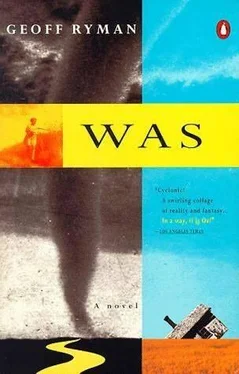"Anything else?" Bill asked, disappointed.
"What, you mean like try to cure them or something? No way, son. That's the Doctor's job."
Tom Heritage pushed against the swinging doors, and they walked into a ward of cots. The old people slept in cots to stop them from rolling out at night. Each one of them had a metal locker that doubled as a bedside table, and a chair to sit on.
"This here's what we call Heaven. It's where all the ones that don't give anyone any trouble are. The Angels."
One old man was still in bed, back turned to the door.
"Okay, Bobby," said Heritage, neatly flipping down one rank of blue cot bars. "It's time to get up. Breakfast."
The old man's face had fallen in on itself, collapsed, and he stared ahead with watery blue eyes. There was white stubble all over his chin.
"Sorry, Bobby, but we got to make your bed." Heritage gave Bill Davison a nod. Bill stared back. "Got to lift him out," explained Heritage. "You take the legs."
Heritage took the arms. Quickly, neatly, the old man was hoisted out of bed and lowered down into his wheelchair. He still stared. One foot began to jiggle up and down with nerves.
Heritage stood back and held up a greeting card from the table, The card had grown soft and worn around the edges, as if trying to grow fur. The corners were grubby. On the front there was a wide-eyed cartoon bunny.
"It says 'Get well soon,' " said Heritage, his eyes and smile just the slightest bit grim.
Heritage wheeled the old man off to his breakfast. All by himself, Bill stripped the beds. It was all so impersonal. The Angels of Heaven were bereft of possessions. Pajamas, a change of clothing, used handkerchiefs, a smell of weak and sweaty bodies. There would be nothing to move away when they died. Heritage returned with the sheets.
About eleven o'clock, they moved off toward the women's ward. From somewhere down the corridor came dim, echoing voices, murmuring or raised and querulous. They sounded like a choir that had not yet begun to sing.
"We treat the women just the same as the men, except that we come in after breakfast when we know they're all decent. Some of the old dears are a bit old-fashioned."
"Don't we do anything to help them?" Bill asked again.
Heritage gave him a thin-lipped smile and shook his head. "Nobody's going to help these people," he said. "Some of them been here for fifty years."
Some of the women sat beside their cots. One of them was making knitting motions with empty hands.
"Good morning, girls," said Heritage. None of them responded, except for one woman who looked up, very slowly, with round, haunted eyes.
Then, suddenly, someone spoke. It was a surprisingly smooth, polished voice, almost like an adolescent's.
"If you're through gabbing, you could get me up off this floor," said the voice. An outraged head reared itself up over the horizon of a crumpled cot.
It was a fine head, a noble head, something like a lion's, ringed with wild gray hair. The eyes were wild too.
Heritage closed his eyes and smiled. "Remember how I said none of them were trouble?" he said. He began to walk backward toward her, looking at Bill, talking to Bill. "Well. Meet trouble."
Bill Davison followed him, tardily. "Dotty," Heritage asked, "what are you doing on the floor?"
"I fell down!" she exclaimed, enraged. "Fell down and I can't get up!"
Tom Heritage had slipped his arms under hers and already had her on her feet when Bill finally arrived to offer assistance. He managed only to touch her elbow.
"Where do you want to be?" Heritage asked.
"Anyplace but here. In that chair."
She moved in tough little jerks, and she talked in tough little jerks. Looking at her, Bill thought: The West, the Old West. She had the tang of it.
"You miss breakfast?" Heritage asked her.
"Dang right," said Dotty. "That eggy stuff looks like cat sick. Can't stand it."
Heritage was smiling again. "Bill," he said, "this here's Old Dynamite. Dynamite Dotty. You want to help people, well this is one of our success stories. Used to take three big men to hold Old Dynamite down. Till she became an Angel and grew wings."
"I," announced Dotty, "always had wings." She began to stroke them, growing invisibly from her shoulders. She looked regal. "Hmmmph!" she said, and made a dismissive gesture.
"Come on, we got to make all these beds," said Heritage.
As they worked, Bill looked at Old Dynamite. A smile had grown on her face. It grew wide and joyous, and the eyes fixed on Heaven seemed to be full of light.
Bill stood and looked at her. He wanted to say to Heritage that she looked like something in a Sunday School painting. Heritage was rolling sheets, quickly, into loosely wound balls and throwing them into sacks. Dimly, Bill could hear her singing. She sang to herself. It was an old, grand song, some kind of hymn, but not one that Bill knew from years of church-going. But he did know it from somewhere. The words, high and thin, over and over, were "Hally hoo hah."
"There's nothing wrong with her," Bill said, later.
"Dot? Stick around," said Heritage.
Bill and Heritage wheeled up lunch in huge industrial catering tureens on carts. They boomed their way through swinging doors that were plated with metal. They themselves ate and then wheeled the tureens back down.
And after lunch, they stood watch over the men and women in the common room. There were wide windows looking over the lawns, It was cold and misty, and the landscape was in layers of misted silhouette. A row of leafless trees looked like charts of nerves.
There was nothing for any of the Angels to do. Some of them were playing cards. The cards were black around the edges. There was a chess set. Pieces were missing. There were a few deserted books, all of them left a quarter of the way through, facedown. And the constant murmuring, almost musical. The sound of the Angels.
"We call this the Pearly Gates," said Heritage.
Women sat mouthing the air or rocking the ghosts of children.
"It's so boring for them," said Bill.
"Used to be a radio, but they kept messing with the dials until it broke." Suddenly Old Dot loomed next to them. She was huge, almost as tall as Bill, and even now neither fat nor thin. She was very stiff on her pins, but that lent her a kind of creeping iron dignity.
"We haven't died, you know," she said, to Heritage. "Not yet, anyway."
Heritage leaned back against the wall and gave her an amused and crooked smile.
He feels superior, thought Bill. That's it. He's not mean or anything. He just knows he's farther up the scale, and he thinks there's nothing to be done. So he won't listen.
Bill thought he knew what the old woman meant. "So you think we shouldn't call this place Heaven?" Bill asked Dotty.
"But it is," she said, suddenly fierce, drawing up. "It is, goddamn it. Take a look! I don't know. You people!"
Old Dynamite turned away, shaking her head. Heritage gave Bill another crooked smile. You see? his raised eyebrows seemed to say. Very slowly Old Dot crept toward the window. From behind, she looked far more frail, bowed, her shoulders turning inward.
She stared out the window at the mist until it was dark.
Without realizing it, Bill must have said something to Mr. Hardie, because a few days later Hardie Electrical Supplies donated a television set to the Home. It was a great embarrassment. First, it embarrassed Bill, who had not asked and thought perhaps the Home would think he had been criticizing it. Second, it embarrassed the Home, which was overwhelmed by the generosity but was worried that one of the Angels would shove a fist into the vacuum tube.
When they tried to give it back, Mr. Hardie apparently suggested that Bill be put in charge of it, to change channels, to turn it off, to wheel it around, to guard its plugs and dials and glass face.
Читать дальше












